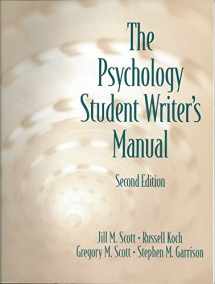
The Psychology Student Writer's Manual (2nd Edition)
Book details
Summary
Description
An essential guide for all writers on the discipline of psychology, this clear-cut, hands-on book shows how to research and write in psychology as well as improve one's overall writing ability. Provides users with a comprehensive reference source on how to research and write papers—including how to conduct research in psychology, how to find information on topics related to psychology, and how to incorporate citations, and presents a thorough review of writing basics and formatting instructions. Comes in three parts—Part I: "A Handbook of Style for Psychology" details writing as communication, writing competently, formats in APA style, and citing sources in APA style; Part II: "Conducting Research in Psychology" explains how to organize the research process, library research, the Internet and distance learning; Part III: "Writing Assignments" offers a critical examination of psychological literature, and explores traditional research papers, experimental research proposals and papers, ethics papers, and genograms. Includes new writing exercises that deal with the special challenges of distance learning, extrasensory perception, and more. For psychologists and those writing about the field.


We would LOVE it if you could help us and other readers by reviewing the book
Book review



